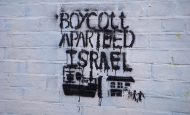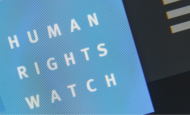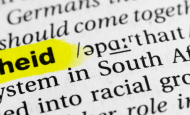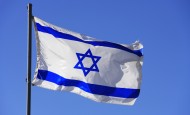Analyzing Amnesty’s Antisemitic Apartheid Attack
On February 1, Amnesty International published yet another volume in the litany of copy-paste NGO reports that label Israel as an “apartheid” state. The publication breaks no new ground and is not meaningfully different from the discredited Human Rights Watch (HRW) and B’Tselem reports from 2021 – yet Amnesty says they took over four years to produce it.
Like many previous NGO publications, Amnesty’s report manipulates and distorts international law, Israeli policy, and events on the ground, as well as denies the Jewish people their right to sovereign equality and self-determination.
Thus, Amnesty’s report can be considered antisemitic according to the IHRA definition of antisemitism, which notes that: “Denying the Jewish people their right to self-determination, e.g., by claiming that the existence of a State of Israel is a racist endeavor.”
Likewise, Amnesty’s report criminalizes Israeli laws and practices designed to safeguard Jewish identity – such as the Law of Return – which are enshrined under international law and parallel the practices of many nation-states.
In the embargoed draft sent to journalists, Amnesty wrote, “This system of Apartheid originated with the creation of Israel in May 1948 and has been build and maintained for decades” – meaning that Israel is inherently illegitimate. Following extensive public criticism of its antisemitism before the report’s publication, Amnesty changed this particular line to read, “This system of apartheid has been built and maintained over decades”; however, the original language remains in materials posted by some Amnesty branches.
In these attacks, Israeli policies are artificially framed as attempts to preserve “Jewish domination” – an antisemitic trope and refrain throughout the publication. Amnesty’s overarching argument is that everything Israel does is nefarious, whether it promotes peace or Palestinian self-detemination, improves the lives of Palestinians or minority groups in Israel, or if mandated by international law. In service of this paradigm, Amnesty – often illogically – ignores or downplays the material differences between Israeli policy toward Palestinians living in Gaza, those living in the West Bank, and the country’s own Arab citizens.
Likewise, Amnesty sees the two-state formula prescribed by the Oslo Accords as part of an apartheid regime. The Accords themselves, in Amnesty’s analysis, are a tool of apartheid despite their being mutually agreed to by the PLO and Israel, and witnessed by the international community.
Consistent with its ongoing advocacy, Amnesty utilizes this publication to call on the international community to adopt and implement anti-Israel BDS and lawfare. The report’s release is timed to bolster a forthcoming March 2022 report from UN Special Rapporteur Michael Lynk that will advance similar allegations, and influence the UN Human Rights Council’s Commission of Inquiry into “all underlying root causes of recurrent tensions … and protratction of conflict, including systematic discrimination and repression based on national, ethnic, racial, or religious identity.”
The following analysis highlights some of the fundamental flaws in Amnesty’s publication:
Amnesty repeatedly utilizes the term “Jewish domination” to describe Israeli policies. Its use recalls the infamous Protocols of the Elders of Zion forgery - “This Protocol has, like the first, never been called in question by the Nation of Jewry. It reveals identically the same plans and purposes of the Jews for World domination and revenge which pervade them all” (emphasis added).
Similarly, its use is a barely-masked reformulation of B’Tselem’s crude term, “Jewish supremacy” – constructed so that the reader will associate Jewish self-determination with white supremacy. Thus, Amnesty merely repeats the canard that labels Israeli sovereignty Jewish self-determination as inherently racist and embracing a “one-state” agenda.
Moreover, as expressed in the introduction, the report is premised on the notion that Israel’s existence is inherently racist, in violation of the IHRA definition of antisemitism.
According to the European Commission Handbook on IHRA, which expounds on this example:
”Denying the Jewish people the right to self-determination and a national homeland is antisemitic because it denies the religious and historic ties of Jews to the land of Israel. It evades the fact that the State of Israel was founded in 1948 based on Resolution 181 (II) of the United Nations General Assembly. Moreover, asserting that a country is a racist endeavour, by portraying ambivalent aspects of modern statehood in a demonizing manner exclusive to the State of Israel, is an attempt to undermine the international legitimacy of a country.”
Among the Israeli laws related to the country’s Jewish character referenced by Amnesty is the Law of Return. Amnesty launches into a discussion of this fundamental law by asserting that
“Demographic considerations have from the outset guided Israeli legislation and policymaking. The demography of the newly created state was to be changed to the benefit of Israeli Jews, while Palestinians – whether inside Israel or, later on, in the OPT – were perceived as a threat to establishing and maintaining a Jewish majority, and as a result were to be expelled, fragmented, segregated, controlled, dispossessed of their land and property and deprived of their economic and social rights.”
The Law of Return grants a special track to Jews from around the world seeking Israeli citizenship. Nothing in the law discriminates against non-Jewish Israeli citizens and is not unique; other countries with diaspora populations – such as Ireland, Spain and Germany, among many others – have instituted legislation to simplify emigration from members of their diaspora.
Additionally, the Law of Return is consistent with the standards of the International Convention on the Elimination of all Forms of Racial Discrimination (ICERD), which mandates the establishment of “special measures” for the “advancement of certain racial or ethnic groups” for protecting the “equal enjoyment or exercise of human rights and fundamental freedoms.” As noted by the UN Committee for the ICERD, this provision is intended to remedy “inequalities resulting from the circumstances of history that continue to deny to vulnerable groups and individuals the advantages essential for the full development of the human personality” and to “prevent[] further imbalances from arising.
Amnesty’s methodology section is opaque and inconsistent with internationally recognized fact-finding standards. It does not name the authors of the report or the experts it consulted for its analysis. It also claims that “to complement long-standing concerns and analyse them through the framework of apartheid, between February 2020 and July 2021, Amnesty International representatives interviewed 56 people in areas that are the focus of these case studies.” These 56 people are not named, how they were selected is not explained, whether Palestinian "minders" were present during interviews is not disclosed, nor is any expertise or relevance to “a framework of apartheid” specified.
Amnesty claims its “research and analysis were guided by a global policy on the human rights violation and crime of apartheid that Amnesty International adopted in July 2017, … [and] follows similar research and analysis conducted on the situation in Myanmar.” However, like HRW that claimed it applied the same analysis to Israel as it had in Myanmar, in fact, Amnesty, continuing to follow HRW's lead, blatantly applies a unique definition to Israel. In Myanmar, Amnesty describes “an imposition of a ghetto-like existence on the Rohingya through extreme restrictions on freedom of movement,” practices akin to the South African regime. And Amnesty’s Myanmar definition tracks more closely to the accepted legal definition and elements, for instance, not defining “domination” as “control” (see legal claims section below).
Amnesty deliberately excludes consideration of “violations committed by Palestinian authorities or armed groups … which are not the focus of this report.” Yet, such violations are directly relevant to the intent behind many of the Israeli policies discussed in the report and are essential to assessing the validity (or its absence) regarding legal elements of the apartheid accusation.
Much like the factual claims in the publication, Amnesty offers nothing new to the legal discussion about apartheid, and simply repeats the same invented and artificial definition offered by HRW and other NGOs. In December 2021, Barrister Josh Kern and NGO Monitor’s Legal Advisor published the first in-depth legal analysis of the elements of the crime against humanity of apartheid. Amnesty does not engage with this research because it demonstrates that Amnesty’s definition is inconsistent with international law and that apartheid is inaccurately applied to the Arab-Israeli conflict.
Although Amnesty asserts that its report is the product of “engaging with and seeking advice from external experts on international law,” these individuals are not named. The citations on points of law are remarkably thin and circular (using sources that simply cite to each other).
Amnesty fails to accurately define the crime of apartheid. For instance, domination is an essential element of the crime. Amnesty, repeating HRW’s false definition, equates the concept of domination with that of “control.” And as opposed to being based on legal analysis, Amnesty’s definition is taken from the Oxford English Dictionary. As a legal matter, this definition is ridiculous as it would mean that any place there is a power differential between countries and/or the existence of minority groups would constitute a situation of apartheid.
Moreover, Amnesty defines the element of domination as “control”, apparently in an effort to mirror the accepted definition of belligerent occupation, and decontextualizing the interpretation of the term as it is understood under the Apartheid Convention (1973) and Rome Statute (2002). As a result, Amnesty’'s definition of domination as control means that any situation of belligerent occupation (the legal paradigm Amnesty applies to the West Bank, Gaza, and East Jerusalem) would be the equivalent of apartheid.
Amnesty also misleadingly relies on the 1973 Apartheid Convention, which was adopted during the Cold War and which was not acceded to by any Western countries, including Israel. As such, and contrary to Amnesty’s claims, it does not rise to the level of customary international law and Israel is not bound by it
Furthermore, Amnesty applies the language of the Apartheid Convention selectively, citing to language that assists its claims while disregarding the provisions that do not. For instance, Amnesty argues that the Convention’s text should inform the definition of “inhumane acts” under the Rome Statute by relying on the much broader definition of “inhuman acts” mentioned in the Apartheid Convention. Conversely, Amnesty claims that “it does not seek to argue that, or assess whether, any system … as perpetrated in Israel and the OPT is, … the same or analogous to the system as perpetrated in South Africa”; yet, the Convention clearly states that the definition of apartheid “shall include similar policies and practices of racial segregation and discrimination as practised in southern Africa.”
Amnesty’s recommendations are a clear call for the elimination of Israel, demanding a Palestinian “Right of Return” (parroting the Palestinian narrative) and the revocation of any laws or practices that protect Jewish identity and national expression.
Amnesty also reiterates its standard calls to pressure the international community to enforce an arms embargo against Israel, create an international tribunal to try Israeli officials for “apartheid,” intimidate corporations to end their business relationships with Israel, encourage the Palestinian Authority to end security cooperation with Israel, and petition the leaders of Arab countries to end the burgeoning rapproachment between Israel and its neighbors.
Amnesty whitewashes and downplays the history of extreme violence directed at Israeli civilians by Palestinian terrorist organizations, including the anti-Jewish riots during the 2021 conflict. Fittingly, the only mentions of the word “terrorist” in the entire document utilize scare quotes for paraphrases or quotations of Israeli sources.
The 4000 rocket attacks from Gaza against Israeli civilians in May 2021 receive only cursory mention, , and there is no acknowledgement that these attacks constitute war crimes committed by Palestinian terrorist organizations. Similarly, the NGO portrays the concurrent anti-Jewish riots as “peaceful protests,” ignoring the murder and injury of Jewish civilians and the widespread vandalism of Jewish-owned property and synagogues.
Callously, the report describes the Palestinian campaign of suicide bombings and roadside shootings in the early 2000s by laconically noting “Palestinian armed groups and individuals deliberately killed Israeli civilians by placing bombs in crowded places and in drive-by shootings both in Israel and in the OPT [Occupied Palestinian Territory].” This understated characterization not only downplays the intensity of these attacks that murdered approximately 1,000 Israelis from 2000-2004, but also sanitizes the targeting of buses, pizzerias, family gatherings, religious celebrations, night clubs, and other civilian locations. Moreover, the lack of detail about the specific threats faced by Israel – particularly the unique threat posed by waves of suicide bombers – decontexualizes the security policies crafted by Israel to protect its citizens.
Unsurprisingly, Amnesty defines “intifada” as “Palestinian uprising against Israel’s military rule,” whitewashing the deliberate use of violence against civilians and wholesale murder of Israelis.
Amnesty’s erasure of Palestinian terror extends to the “case studies” throughout the report. Many of them champion the causes of individuals who have pursued and perpetrated violent attacks against civilians.
For instance, without mentioning the names of the affected individuals, Amnesty decries the Israeli revocation of residency status of four Jerusalem residents in 2006. The four men in question are Muhammad Abu Tir, Ahmad Attoun, Muhammad Totah and Khaled Abu Arafeh, all Hamas members.
According to Israel’s High Court of Justice (HCJ 7803/06):
- Abu Tir “is a Hamas parliament member. He has a rich history of carrying out a wide range of activities and is a veteran military member, who was released from Israeli jail in 2005 after serving an accumulated 25 years in prison for his involvement in hostile military activity.” The ruling describes Abu Tir’s involvement in Hamas’ military operation in 2011-2014, including his “direct and indirect involvement in funding and advancing various military activities as…carrying out terror attacks in 2012-2014…acquiring a hideout apartment, purchasing weapons for and funding various operatives and linking several Hamas operations located throughout different towns in Juedea and Samaria.”
- Attoun “is a veteran and senior member of Hamas…who is in contact with Hamas leadership and has operated to advance the organization’s operation in Judea and Samaria and Jerusalem.” He has “participated in official Hamas events which praise ‘martyrs’ and call for military operations.”
- Totah is a “veteran member of Hamas in Jerusalem…who served in prison for his criminal activities in Hamas.”
- Abu Arafeh is “arrested from time to time due to his activity in Hamas…according to intelligence findings, he is a prominent actor who deals with directing activities with Hamas leaders in the field, specifically with Hamas leadership and its members in Jerusalem.”
It similarly addresses the 2019 revocation of residency of Munir Rajabi and Ishaq Arafa for their “alleged participation in attacks against Israelis.”
- According to a petition by HaMoked to the HCJ (6049-19), Rajabi was sentenced to life imprisonment “for his involvement in a serious terror attack in bus line 37 in Haifa in 2003, in which 17 people were murdered and numerous others were injured…”
- According to the Israel Security Agency (Shabak), Arafa “a military operative of Hamas carried out an attack in Jerusalem in March 2011, in which a woman was murdered and 47 others were injured.”
Likewise, the report cites the case of Salah Hammouri, a Palestinian convicted in 2005 of attempting to assisnate then Israeli Chief Rabbi Ovadia Yosef and who has served several stints in administrative detention due to his terror-related activities.
Hammouri has long served as an employee of the Palestinian NGO Addameer, designated as a terror organization by Israel in October 2021 due to its close ties to the internationally-recognized terror group, the Popular Front for the Liberation of Palestine (PFLP).
Along with Addameer, Israel designated five other PFLP-affiliated organizations, including the Union of Agricultural Work Committees (UAWC). In January 2022, the Dutch government announced that it would cancel funding to this organization, after an 18-month long independent investigation revealed at least 34 UAWC employees from 2007 that were also PFLP members. This followed the Netherlands’ July 2020 decision to launch the investigation, due to the arrest of two senior UAWC officials for allegedly orchestrating an August 2019 bombing that murdered an Israeli teenager, Rina Schnerb.
Amnesty, however, glosses over and ignores these terror connections, claiming instead that “Palestinian organizations and human rights defenders who have been leading anti-apartheid advocacy and campaigning efforts have faced Israeli repression for years as punishment for their work. In October 2021, the Israeli authorities escalated their attacks on the Palestinian human rights movement even further by designating six prominent civil society organizations as ‘terrorist organizations’, allowing the Israeli authorities to shut down their offices, seize their assets and detain and prosecute their employees, in addition to prohibiting funding or even the public expression of support for their activities. In parallel, Israel has subjected Israeli organizations denouncing apartheid to smears and delegitimization campaigns.”
Amnesty’s whitewashing of terror organizations appears to extend to Hezbollah. In the report, Amnesty decries that “Palestinian Knesset members have been subjected to repeated smear campaigns and intimidation by government ministers, in addition to judicial harassment in their struggle for equality, and for expressing support for popular resistance to the Israeli occupation and other political views that challenge the established narrative of Israel as a Jewish and democratic state.”
The incident that Amnesty cites to is a 2006 High Court of Justice case against then MK Azmi Bishara for making a speech in Syria in which he praised Hezbollah.
Additionally, Amnesty also invokes the phrase “popular resistance” in relation to Hamas-orchestrated riots on the Gaza border, in which Palestinians opened fire on and killed Israeli forces, launched fire bombs and incendiary balloons at civilian areas, and committed other acts of violence.
Amnesty’s “one-state” prescription for eliminating Israel manifests in a variety of ways, including in the conflation of Israel’s Arab citizens with non-citizens residing in the West Bank and Gaza.
This includes the bizarre suggestion that “Israel maintains Jewish domination over the Palestinian economy through the exclusion and intentional neglect of Palestinian communities inside Israel” – as if one can meaningfully discuss a single “Palestinian economy.”
Amnesty also appears to expect Israel to annex the West Bank and Gaza and apply Israeli civilian law in those territories – which would completely contradict the legal framework of occupation that Amnesty otherwise employs. Instead of reflecting Israel’s obligations under international law, Amnesty argues that "The very existence of these separate legal regimes [in Israel, the West Bank, and Gaza], however, is one of the main tools through which Israel fragments Palestinians and enforces its system of oppression and domination."
In furthering its one-state paradigm, whereby Israel ought to view its own Arab citizens and Palestinians living in the West Bank identically and without considered analysis of the different rights afforded to citizens as opposed to non-citizens, Amnesty declares,
“Since its creation, the Israeli state has enforced massive and cruel land seizures to dispossess and exclude Palestinians from their land and homes. Although Palestinians in Israel and the OPT are subjected to different legal and administrative regimes, Israel has used similar land expropriation measures across all territorial domains under the Judaization policy, which seeks to maximize Jewish control over land while effectively restricting Palestinians to living in separate, densely populated enclaves to minimize their presence.”
Strongly disproving this claim, in December 2015, the Israeli government initiated a 5-year, NIS 15 billion plan to develop non-Jewish towns in Israel, including by improving planning and building. According to the Israeli government Planning Authority, in 2020, nearly 38% of all housing approvals issued in 2020 were for homes in Arab communities – nearly double the proportion of Arab citizens in the country.
Regarding demolitions of Palestinian structures in the West Bank Amnesty ignores the layers of judicial review that such actions undergo and the regularly exercised rights of Palestinians to petition Israeli courts to appeal and prevent such enforcement measures. Similarly, the NGO ignores the variety of valid reasons for rejecting a building permit such as safety, health, and environmental considerations. (For more information on Israeli judicial review of demolitions in the West Bank, see NGO Monitor’s “Analysis of Lawyers for Palestinian Human Rights Complaint Regarding JCB”).
Conclusion
Every aspect of the Amnesty International version of the apartheid campaign reflects its political agenda of exploiting tragedy to delegitimize Jewish sovereign equality and self- determination. Essentially, Amnesty demands the elimination of the Jewish State, and justifies doing so by perverting international law, misrepresenting Israeli laws and practices, and presenting an apologetic view of the murder of Israelis by Palestinian terrorists.
In other words, exactly what you would expect from an organization that thrives on a culture of anti-Israel delegitimization and demonization and has been marred by antisemitic incidents.





